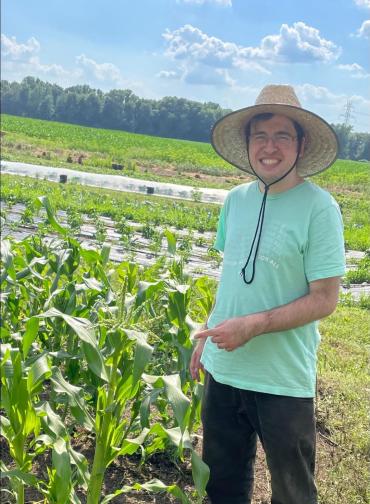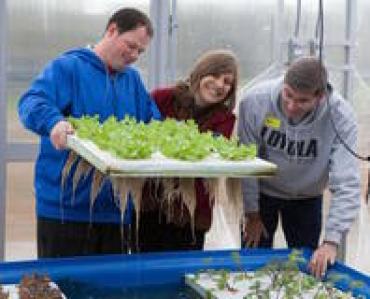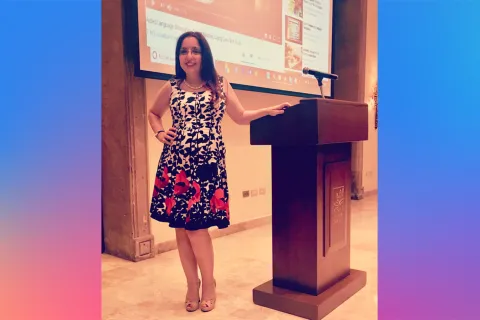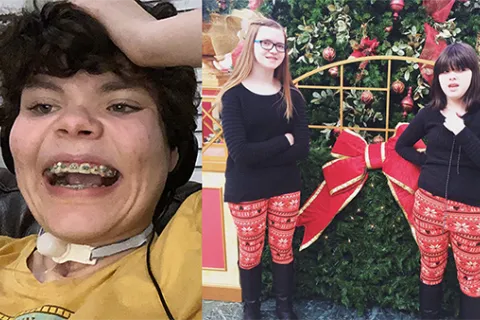Chris Tidmarsh is plowing a path to employment for other autistic adults at Green Bridge Growers
Haga clic aquí para acceder este recurso en español.
Hard work alone is never enough to succeed. Many autistic adults know this well. National data shows that most are unemployed or underemployed, despite having the skill sets and expertise to excel in the workplace. Farmers know this, too. In this country, their long days of labor-intensive work is increasingly challenged by climate change, soil erosion, production expenses, and access to capital.
Neither of these facts sit well with 34-year-old Chris Tidmarsh. Autistic by diagnosis and an environmentalist by way of a college degree, he set out to take matters into his own hands, literally. In 2013 he started Green Bridge Growers (Mishiwaka, IN) with his mom, Jan Pilaski. Their mission: use innovative methods to grow sustainable, fresh produce year-round and create jobs that harness the amazing skills of young adults with autism.
Below, Chris shares what amounts to a masterclass in becoming a successful entrepreneur with an inclusive workplace.
Life as an autistic employee in a traditional workforce
I graduated in 2010 from Hope College (Holland, MI) with degrees in French, chemistry, and environmental studies. The environment has been a passion of mine for a really long time, leading me to study it in college and pursue sustainable agriculture as a career.
After college I took a job as an environmental researcher. I am visual learner, and it was hard for me to adapt to everything being done by speaking. For instance, directions were communicated verbally, but I do better when they are through emails or texts. Social skills-related issues led me to leave the position after a few months. After that, I decided it would be a good idea to start my own farm, to employ others like me who are on the autism spectrum and build a business around our strengths.
Life as an entrepreneur
When we toured different farms to research what was possible in our area, aquaponics stood out as a way to grow throughout the entire year. Aquaponics is a soilless method for growing crops where plants and fish grow in tandem. It uses 90% less water than conventional farming and because we grow vertically, we conserve space and can grow more plants. Our fish basically act to fertilize our plants. Their waste is turned into a form of nitrogen the plants use to grow, and the plants clean the water back to the fish.
We received great guidance in small business development from a start-up incubator at the University of Notre Dame. We had the opportunity to prototype our idea in partnership with an agency in our hometown serving those with disabilities called Hannah and Friends. We learned so much by piloting and testing our growing methods and demonstrating the capabilities of those on the autism spectrum in farming.
Our original prototype greenhouse is 300 square feet. At that location, we also managed a large garden. We are now on five acres and have six employees. We currently have two greenhouses in cultivation totaling 4,500 square feet and are building a new 3,000-square foot greenhouse early next year. We primarily grow lettuces, herbs, and other specialty greens. In our “high tunnel” greenhouse we grow kale, collards, tomatoes, carrots, eggplant, and basil. In our field we produce beans, sweet corn, potatoes, squashes, pumpkins, and garlic. All of it is grown organically and we take great pride in growing food that’s of the highest quality.
We supply to restaurants, grocery stores, health food stores, early childhood centers, and farmers’ markets. Because we are also very concerned about food access, we deliver weekly produce shares to food pantries and agencies serving people in need. Having a wide range of customers really has helped our business a lot.
As an entrepreneur you realize you can’t do everything yourself. You have to find out what you don’t know and learn your limits. You can bring to your team those who can do what you’re not able to do. I also like to teach and train those who come to work with us so they can grow their own skills. I hope to always keep learning which seems what entrepreneurs should do to do a great job.
Through a combination of both training and employment, we have helped 40 autistic youth and young adults gain skills to prepare them to find employment.
Life as a champion of autistic employees
Green Bridge Growers’ name itself tells our story: we are “green” because we are committed to caring for the earth and using the most sustainable methods possible; we are a “bridge” because we are a pathway to employment and training for autistic individuals, and we are “growers” not just of the delicious vegetables we produce, but of the people we train and employ.
Through a combination of both training and employment, we have helped 40 autistic youth and young adults gain skills to prepare them to find employment. We are proud to provide a program in collaboration with our local public school system that specifically provides training in the various tasks required at our farm.
The great thing about operating our farm is that autistic workers with a variety of skill levels can participate. In my experience those on the spectrum can be very attentive to details and want to follow through on tasks to see them to completion. Many of our team and trainees are good problem-solvers and help think about better ways to do a task or project. They often want to learn about what and why they’re doing something.
We also have to be thorough, consistent, and work on a schedule. Our autistic team members have the ability to do that. Most of all, there’s great pride in the work accomplished. Our autistic team members want to benefit the community and are proud to see our product on the shelves of grocery stores or to know that we are helping feed the hungry. Everyone brings their skills to the table and our work gets done. It’s teamwork of the very best kind.
Advice for aspiring autistic entrepreneurs
As an entrepreneur, you will be an ambassador to show what autistic people are capable of. The work you do is important and makes a difference for many, many others.
If you have the chance to employ others with autism, put them in the forefront. Do all you can to help autistic employees grow, learn, and become leaders at what they do.
Be sure whatever you sell or provide the community is of the very highest quality. That will help potential customers get behind your business and support even more the idea of a business that employs autistic individuals.
For more information on navigating employment, check out our Roadmap to Meaningful Employment for Autistic Adults.










